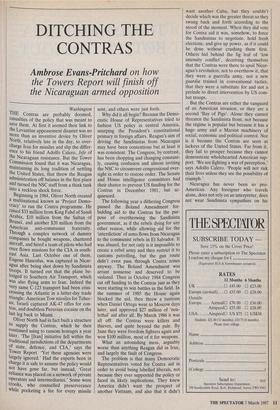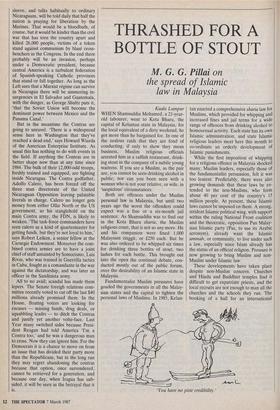DITCHING THE CONTRAS
Ambrose Evans-Pritchard on how
the Towers Report will finish off the Nicaraguan armed opposition
Washington THE Contras are probably doomed, casualties of the policy that was meant to save them. At first it seemed their link to the Levantine appeasement disaster was no more than an inventive device by Oliver North, relatively late in the day, to over- charge Iran for missiles and slip the differ- ence to his friend Adolfo Calero, Jefe of the Nicaraguan resistance. But the Tower Commission found that it was Nicaragua, maintaining its long tradition of nettling the United States, that threw the Reagan administration off balance in the first place and turned the NSC staff from a think tank into a reckless shock force.
Beginning in 1984, Oliver North created a multinational known as `Project Demo- cracy' to run the Contra programme. He raised $33 million from King Fand of Saudi Arabia, $10 million from the Sultan of Brunei, and another $20 million from the American anti-communist fraternity. Through a complex network of dummy companies he bought weapons, chartered aircraft, and hired a team of pilots who had once flown missions for the CIA in south- east Asia. Last October one of them, Eugene Hasenfus, was captured in Nicar- agua after being shot down by Sandinista troops. It turned out that the plane be- longed to Southern Air Transport, which was also flying arms to Iran. Indeed the very same C-123 transport had been criss- crossing the Atlantic in a latter-day trade triangle: American Tow missiles for Teher- an, Israeli captured AK-47 rifles for con- tras, and doubtless Peruvian cocaine on the last leg back to Miami.
Oliver North had in fact built a structure to supply the Contras, which he then Continued using to ransom hostages a year later. `The [Iran] initiative fell within the traditional jurisdictions of the departments of state, defence, and CIA,' says the Tower Report. 'Yet these agencies were largely ignored.' Had the experts been in Charge it is safe to assume the policy would not have gone far, but instead, `Great reliance was placed on a network of private operators and intermediaries.' Some were crooks, who counselled preserverance while pocketing a fee for every missile sent, and others were just fools.
Why did it all begin? Because the Demo- cratic House of Representatives tried to fashion US policy in central America, usurping the President's constitutional primacy in foreign affairs. Reagan's aim of driving the Sandinistas from Nicaragua may have been contentious but at least it was consistent. The Congress, by contrast, has been chopping and changing constant- ly, causing confusion and almost inviting the NSC to circumvent congressional over- sight in order to restore order. The Senate and House intelligence committees had their chance to prevent US funding for the Contras in December 1981, but ac- quiesced. The following year a dithering Congress passed the Boland Amendment for- bidding aid to the Contras for the pur- pose of overthrowing the Sandinista government, as if the rebels dying for any other reason, while allowing aid for the `interdiction' of arms flows from Nicaragua to the communist rebels in El Salvador. It was absurd, for not only is it impossible to create a rebel army and then restrict it to customs patrolling, but the gun route didn't even pass through Contra zones anyway. The Boland Amendment was arrant nonsense and deserved to be violated. Then in October 1984 Congress cut off funding to the Contras just as they were starting to win battles in the field. In the summer of 1985 the House again blocked the aid, then threw a tantrum when Daniel Ortega went to Moscow days later, and approved $27 million of 'non- lethal' aid after all. By March 1986 it was all off: the Contras were killers and thieves, and quite beyond the pale. By June they were freedom fighters again and won $100 million, most of it for weapons.
What an astonishing mess, arguably worse than anything Reagan did in Iran, and largely the fault of Congress.
The problem is that many Democratic Representatives voted for Contra aid in order to avoid being labelled liberals, not because they ever supported the policy or faced its likely implications. They knew America didn't want the prospect of another Vietnam, and also that it didn't want another Cuba, but they couldn't decide which was the greater threat so they swung back and forth according to the mood of the moment. When they did vote for Contra aid it was, somehow, to force the Sandinistas to negotiate, hold fresh elections, and give up power, as if it could be done without crushing them first. Others hid behind the fig leaf of `low intensity conflict', deceiving themselves that the Contras were there to spoil Nicar- agua's revolution, not to overthrow it, that they were a guerrilla army, not a new guardia trained in conventional tactics, that they were a substitute for and not a prelude to direct intervention by US com- bat troops.
But the Contras are either the vanguard of an American invasion, or they are a second `Bay of Pigs'. Alone they cannot threaten the Sandinista front, not because the regime is popular but because it has a huge army and a Marxist machinery of social, economic and political control. Nor is it because the Contras are seen as lackeys of the United States. Far from it, they fail to prosper because they cannot demonstrate wholehearted American sup- port. `We are fighting a war of perception,' says Adolfo Calero. 'People will not risk their lives unless they see the possibility of triumph.'
Nicaragua has never been so pro- American. Any foreigner who travels alone, does not rely on an interpreter, does not wear Sandinista sympathies on his sleeve, and talks habitually to ordinary Nicaraguans, will be told daily that half the nation is praying for liberation by the Marines. That would be a bloodbath, of course, but it would be kinder than the civil war that has torn the country apart and killed 26,000 people, victims of a token stand against communism by blasé cross- benchers in the Congress. In the end there probably will be an invasion, perhaps under a Democratic president, because central America is a turbulent federation of Spanish-speaking Catholic provinces that stand or fall together. As long as the Left sees that a Marxist regime can survive in Nicaragua there will be simmering in- surgencies in El Salvador and Guatemala, with the danger, as George Shultz puts it, `that the Soviet Union will become the dominant power between Mexico and the Panama Canal.'
But in the meantime the Contras are going to unravel. 'There is a widespread sense here in Washington that they've reached a dead end,' says Howard Wiarda of the American Enterprise Institute. As usual this has nothing to do with events in the field. If anything the Contras are in better shape now than at any time since 1984. The bulk of their 12,000-odd troops, freshly trained and equipped, are fighting inside Nicaragua. The Contra godfather, Adolfo Calero, has been forced off the three man directorate of the United Nicaraguan Opposition leaving palatable liverals in charge. Calero no longer gets money from either 011ie North or the US government, so his stanglehold on the main Contra army, the FDN, is likely to weaken. 'The task-force commanders have seen calero as a kind of quartermaster for getting funds, but they're not loyal to him,' says Robert Leiken, a senior fellow at the Carnegie Endowment. Moreover the com- bined contra armies are to have a joint chief of staff untainted by Somocismo, Luis Rivas, who was trained in Guerrilla tactics in Cuba, fought as a comandante in the war against the dictatorship, and was later an officer in the Sandinista army.
All to no avail; scandal has made them lepers. The Senate foreigh relations com- mittee recently voted to cut off the last $40 milliona already promised them. In the House, floating voters are looking for excuses — missing funds, drug deals, or squabbling leadrs — to ditch the Contras and justify yet another volte-face. Last Year many switched sides because Presi- dent Reagan had told America 'I'm a Contra too,' and he was a dangerous man to cross. Now they can ignore him. For the Democrats it is a chance to move on from an issue that has divided their party more than the Republicans, but in the long run they may regret abandoning the contras because that option, once surrendered, cannot be retrieved for a generation, and because one day, when Iragua has sub- sided, it will be seen as the betrayal that it is.



























































 Previous page
Previous page